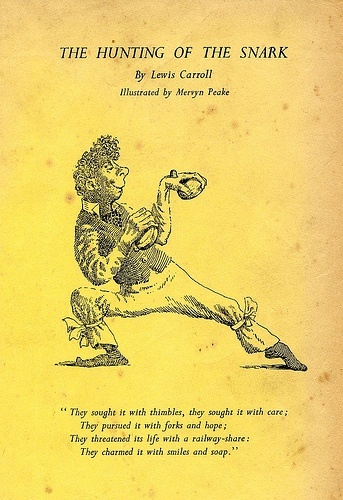
You don’t have to hunt it. You just have to kill it. http://www.flickr.com/photos/jim_and_kerry/3066976334/
Time for some tough love, guys. I need to talk to you about that word. The one people have been in love with for a decade. The vaguely British synonym for sarcasm. You know the one: Snark.
Look, I loved it at first too. It’s like a wittier form of sarcasm, yes? At any rate it sounds better than sarcasm, which (perhaps rightly) sounds like a terrible skin condition. Snark sounds like dry humor: quirky, funny enough to make you snort, and yet scathing. If something is snarky, it has a little snap to it; a little bite.
Except, no.
Snark has been bandied about so much that it’s lost that charm, and for me, it no longer means what it meant when I first heard it.
What seemed refreshing about snark in 2003 was its perceived wryness. At the time, society needed a healthy dose of skepticism and — in hindsight — for me and Americans of certain political leanings, borrowing a word for that from another country was just the thing.
But in the last 10 years, thanks to overuse, snark has dulled. It’s used to mask bitterness (the same fuel that powers and poisons sarcasm) has become overly caustic at times, and, as a synonym for sarcasm, may entering cliché territory. Like any trendy word, snark has lost its sparkle. It’s become just another part of our slang, another lazy word.
Don’t believe me? Go look at your social media accounts. A perusal of Twitter will show you people applying snark to everything from bad puns to their own wit. Some go as far as identifying snark as a lifestyle. This, to me, is a sign: It’s time for snark to go.
In 2003, snark seemed to be riding the Harry Potter-inspired wave of Britishisms that infected my geeky little enclave. Snape (when he wasn’t being downright abusive) was snarky. When Doctor Who started up again in 2005 it seems that a whole new batch of Americans became infected with snark. And then along came Sherlock in 2010.
Despite the fact that I can’t remember once seeing or hearing the word snark in any of these books or shows, snark seems to have ridden to the New World aboard these franchises like a plague rides a rat, because all of a sudden everyone in the U.S. seemed to be infected. (Weirdly, I actually haven’t heard my British friends use snark that much, if at all. But maybe that’s because I don’t live in the U.K)
But guess what? Snark is much, much older than Harry Potter, or Doctor Who or the sexy new version of Sherlock Holmes.
It is, however, contemporary with the original Sherlock Holmes, and the original definition fits the original character.
According to Webster, the word snarky first appeared in the UK between 1910 and 1915, and it didn’t mean sarcastic. What it meant was “testy or irritable.” It could also mean “to nag, or find fault with,” which means I just snarked at my poor husband about our grocery list. (Sorry, honey.)
While I don’t know when exactly snark stopped being about nagging and started being a synonym for sarcasm (It’s not listed at all in a 1970s edition of The Dictionary of Slang and Unconventional English) it’s interesting to note that Lewis Carroll’s The Hunting of the Snark was published in 1876 and possibly helped to bring the term into the language.
Who knows? If snark continues to travel one of its current paths, acting as a mask for discontent, it may end up once again meaning “testy and irritable” in which case, this whole post has been an exercise in snark.
Let’s put it out of its misery before it ends up being an indicator of ours. Let’s resign it once again to the yellowing pages of Webster’s Unabridged Encyclopedic Dictionary, so that our great-grandchildren can find it and repurpose it as we have done.
Sometimes you just have to let something you love go.
